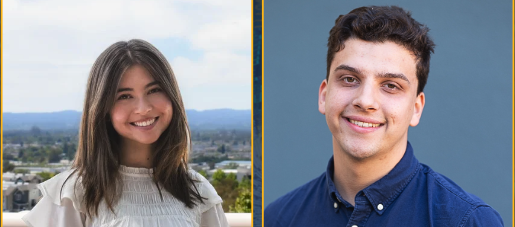Two mechanical engineering students, Sacha Escudier and Chiyo McMullin, are the recipients of the College of Engineering’s 2024 Tirrell Award for Distinction in Undergraduate Research. The annual award, named in honor of the college’s former dean, Matthew Tirrell, recognizes a graduating senior for showing excellence and promise as a researcher. The award serves as motivation and validation for both of this year’s recipients, who will recognized during the college’s Undergraduate Commencement, scheduled for Saturday, June 15, at 4 PM on the Commencement Green.
“I’m deeply honored. There are many other graduating seniors across the College of Engineering, who have done tremendous work and are pursuing research careers,” said Escudier, who graduated from Granada Hills Charter High School. “I would like to extend this award to them as well; they deserve recognition as much as I do.”
“I am so honored to be recognized as a promising researcher,” said McMullin, who graduated from Cupertino High School. “Research has always been very exciting to me, but I never felt like my personal impact was very large. Receiving this award makes me realize that the long hours in the lab were important and my efforts did not go unnoticed.”
McMullin joined materials professor Tresa Pollock’s research lab as an undergraduate researcher in May 2022. For eighteen months, she worked under postdoctoral researcher Sebastian Kube, designing multi-principal metal alloys having a BCC-B2 crystal structure intended to increase operating temperatures of aerospace and nuclear materials. The experience allowed her to build a strong foundation of research principles and sample preparation techniques, as well as contribute to a published paper. For the past six months, and under the guidance of materials graduate student Melina Endsley and postdoctoral researcher Collin Holgate, McMullin has designed and synthesized new intermetallic bond-coat-alloy systems aimed at overcoming fundamental barriers to higher-temperature operation in gas turbines.
“Research excites me, because it gives me the opportunity to be at the forefront of something revolutionary,” said McMullin, who also held officer positions in the UCSB chapters of Engineers Without Borders and Theta Tau. “As a problem-solver, research lets me investigate root causes and brainstorm solutions where there is no right answer, allowing me to be creative and imaginative. As a lover of learning, there is no boundary to the knowledge I can acquire, which is beautiful and captivating.”
McMullin says that it has been thrilling to work with people who are experts in their field and understand concepts that are far beyond the scope of what is covered in class. In addition to her research supervisors, she also thanked mechanical engineering associate teaching professor Tyler Susko, mechanical engineering professor Sam Daly, and Trevor Marks, a research and development engineer for helping her believe in herself and realize her potential. After graduation, McMullin will start working as a reliability engineer in Medtronic’s Structural Heart and Aortic Department, performing test-method validations and failure analysis on next-generation cardiovascular devices.
“I have always been passionate about working in the medical-device industry, so I am overjoyed to say that my dream is coming true!” said McMullin, who plans to eventually pursue a PhD in cardiovascular or rehabilitation medical devices with a materials emphasis. “UCSB has provided me with endless skills and experiences that make me confident in my abilities to succeed in my future career and research projects.”
Escudier will enter the mechanical engineering PhD program at Princeton University in the fall. He will continue working in the area of fluid mechanics, the field in which he entered the Multiphase and Multiscale Flow Lab of Alban Sauret, an associate professor of mechanical engineering at UCSB, as an undergraduate researcher in summer 2022. Escudier feels confident that his time at UCSB will allow him to succeed at his next step.
“As a researcher in engineering, it is essential to be able to bridge the gap between the abstract and the theoretical nature of research problems and their potential engineering applications,” said Escudier. “I believe that UCSB has done an excellent job at that. Through the diverse backgrounds of various faculty members and their respective experiences, I feel that I have developed the ability to tackle such problems in the context of research, and I look forward to applying those skills in the future!”
During the past two years as an undergraduate, Escudier first collaborated with a visiting graduate student, modeling the probability of clogging in confined channels of monodisperse suspensions. Later, he worked independently on projects pertaining to flow in millifluidic channels. He co-authored papers on two of those projects and presented the group’s findings at two major conferences.
“I have been able to immerse myself fully in the fluids community and learn more about people’s interests as a whole, which only reinforced my desire to pursue a career in research,” he said. “All of these experiences have enabled me to develop confidence as a researcher, and have ultimately given me an invaluable skill set for conducting novel research projects in the future.”
